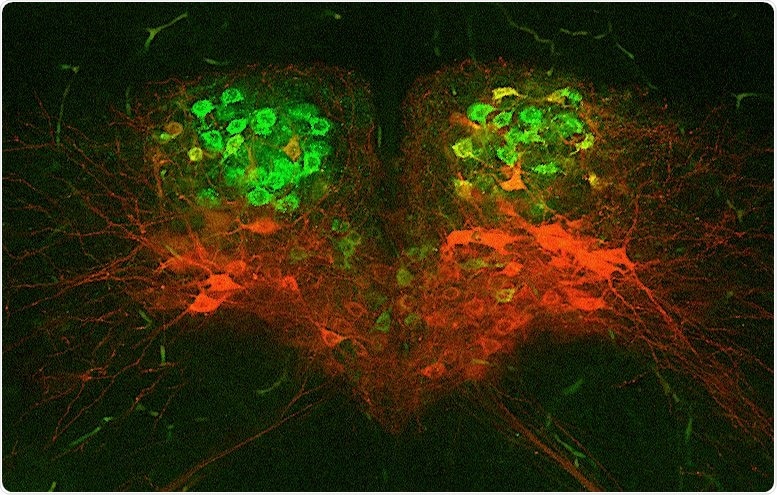According to neuroscientists from Virginia Tech and George Washington University, misfiring brain cells that regulate vital parts of the tongue and mouth might be creating swallowing problems in kids suffering from neurodevelopment disorders.

The motor neurons that retract the tongue are labeled green, and those that protrude the tongue are labeled red in this image of the brainstem from a newborn mouse. The activity of these two populations of motor neurons is not coordinated properly in mice with the same mutation that causes human DiGeorge syndrome, according to scientists with the Fralin Biomedical Research Institute and George Washington University. This lack of coordination likely underlies suckling, feeding, and swallowing difficulties in the mice, and perhaps human infants with the disorder, which occurs in newborns when a piece of the 22nd chromosome is missing. Image Credit: Xin Wang and Anastas Popratiloff/George Washington University.
In a study involving a mouse model of a genetic childhood disorder called DiGeorge syndrome, investigators identified that brain cells, known as motor neurons and which directly regulate the tongue muscles, were firing spontaneously and did not synchronize with the mechanisms that should regulate their activity.
Identifying ways to calm the motor neurons that are responsible for shifting the tongue could result in enhanced function in very young kids who find it difficult to eat swallow, or make sounds. But according to the researchers, additional studies are required before therapies can be developed.
We are continuing to make the case that activity of the motor neurons that command the movement of key parts of the mouth, tongue, and pharynx are disrupted by the same mechanisms causing genetic neurodevelopmental disorders. Our goal is to learn about the causes of these symptoms to help children as early in life as possible.”
Anthony-Samuel LaMantia, Study Senior Co-Author, Developmental Neurobiologist, and Professor, Fralin Biomedical Research Institute, College of Science, Virginia Tech
The study results were published online in advance in eNeuro—an open-access journal of the Society for Neuroscience.
Around 80% of children with developmental disorders find it difficult to chew, swallow, or ingest food. This can result in choking, food aspiration, or even life-threatening respiratory infections.
Feeding, suckling, and swallowing problems—called pediatric dysphagia—are among the most frequent and serious complications in infants. These complications are common in DiGeorge syndrome, a genetic disease that occurs when a tiny section of chromosome 22 is absent. This syndrome carries a significant risk for schizophrenia and autism spectrum disorder and also causes malformations of the face, heart, and limb.
In the latest research work, associate research professor Xin Wang and the study’s co-senior author David Mendelowitz, both from the George Washington University School of Medicine and Health Sciences, initially tracked the motor neurons in mouse models of DiGeorge syndrome from their muscles of interest, then marked each class of motor neuron, and finally captured their electrical characteristics.
Mendelowitz is also the vice chair and professor of pharmacology and physiology from the George Washington University School of Medicine and Health Sciences.
The motor neurons that are responsible for causing the backward and forward movement of the tongue in the DiGeorge syndrome mouse models fired spontaneously when compared to motor neurons of standard mice, and the inhibitory responses did not balance the excitatory impulses.
Consequently, the increased excitability of motor neurons impacted the movement and compression of the tongue muscles, which would endanger the efficiency of food intake and also airway safety in toddlers and infants.
LaMantia, also a professor at the Virginia Tech College of Science, put the latest study into the perspective of more recent studies from his laboratory and others relating to the biological and genetic basis of pediatric dysphagia.
This study adds to an increasing amount of evidence gathered over the last several years that genetic mutations associated with neurodevelopmental disorders can indeed have as their 'first hit' cranial nerve sensory and motor circuits that facilitate suckling, feeding, and swallowing as one of the first complex behaviors that infants perform.”
Anthony-Samuel LaMantia, Study Senior Co-Author, Developmental Neurobiologist, and Professor, Fralin Biomedical Research Institute, College of Science, Virginia Tech
LaMantia is also the head of the Center for Neurobiology Research at the Fralin Biomedical Research Institute and a professor in the Department of Biological Sciences of the College of Science.
Source:
Journal reference:
Wang, X., et al. (2020) Disrupted Coordination of Hypoglossal Motor Control in a Mouse Model of Pediatric Dysphagia in DiGeorge/22q11.2 Deletion Syndrome. eNeuro. doi.org/10.1523/ENEURO.0520-19.2020.